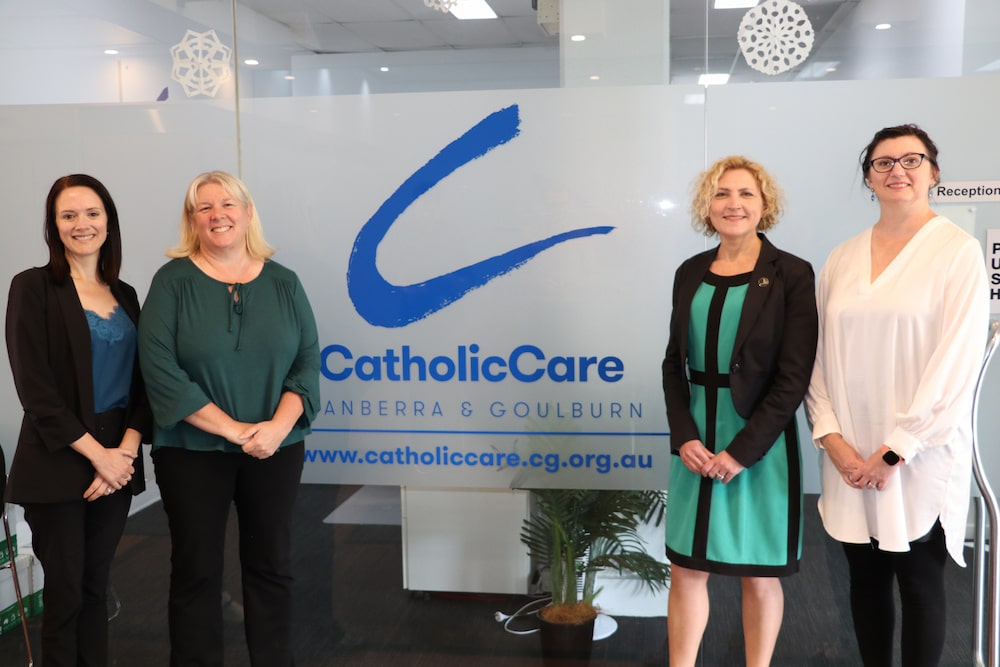From next year, Canberrans with eating disorders will be able to access an early intervention service run by CatholicCare in Braddon.
Currently, only 5 to 15 per cent of people with eating disorders access treatment, and then only four to 10 years after the onset of the disorder, Emma Davidson, ACT Minister for Mental Health, explained.
“By the time they seek treatment, they need more time in therapeutic care and more acute services.”
The new service is aimed at people in the early stages of developing an eating disorder and those with an eating disorder of low to moderate severity. It will help people at an earlier point in their journey towards recovery, and reduce demand on specialist and acute inpatient services, Ms Davidson said.
“If we can encourage people to access an early intervention service and to seek care sooner, then they will be feeling better sooner,” the minister said.
The new early intervention service will open in February 2023; CatholicCare expects to see 80 young people and their families in the first year, CEO Anne Kirwan said.
The service will treat patients aged 16 years and older. Most will be younger people going through transitions in life, Ms Kirwan said.
The number of people needing help for mental health conditions, including eating disorders, has increased in the last couple of years, and eating disorders are starting at a younger age, Ms Davidson said.
Treatment for eating disorders is complex, Ms Davidson noted; it involves medical and psychological services, and has a sociocultural aspect (ideas about beauty and the thin / athletic ideal).
The service will adopt the FREED (First Episode Rapid Early Intervention for Eating Disorders) model, developed in the UK for 16- to 25-year-olds who have had an eating disorder for less than three years.
The holistic program will provide better long-term health outcomes, shorter recovery times, and reduce the need for interventions such as hospitalisations, Ms Kirwan said.
The ACT Government will provide $230,000 annually to CatholicCare to deliver the program; the Commonwealth will match the funding for the next four years.
This is CatholicCare’s first foray into eating disorders, Ms Kirwan said, but the organisation has a long history of providing clinical intervention services. It has worked in this space through the eSTEPS, Youth and Wellbeing, Next Step, and Better Access programs, while its skilled clinicians are trained to deliver appropriate services to young people, including for eating disorders.
Eating disorder advocate Kate Steen welcomed the announcement.
“Focusing on early detection and intervention is important because the sooner you seek help, the higher your prospects of recovery,” she said. “This sounds like it will form an important part of the suite of services that are going to be provided to Canberrans living with eating disorders, and, as with all such services, it would be tremendous to see it operational sooner rather than later.
“February is just around the corner – but even before then is Christmas, which can be a stressful time for people living with eating disorders, as well as their loved ones. Be kind to yourself and those around you. The Butterfly Foundation has some helpful advice on navigating this period.”
If you, or someone you know, needs help with an eating disorder, or body image concerns, contact The Butterfly Foundation on 1800 334 673, or visit butterfly.org.au.
The early intervention service is one of several ACT Government-funded programs for eating disorders.
The Eating Disorders Clinical Hub, launched in January, is the central referral point for eating disorder services in the ACT. It has reduced wait times for people to access services, and connects and provides a network for eating disorder services in the ACT, Ms Davidson said.
- New central hub in ACT for eating disorders (25 January)
A residential eating disorder facility will be built in Coombs next year: “A beautiful facility that really fits into the local community, and feels more like home than going into a clinical setting,” Ms Davidson said. A procurement process is underway to find a constructor.
- ACT Residential Eating Disorder Facility to be built in Coombs (9 November)
- Draft designs of ACT eating disorder centre released (27 August)
Ms Davidson considers it important to provide public health services.
“A lot of families who have tried to access services for eating disorders have looked at private services where there are fees and other barriers to accessing services,” she said. “The more barriers we can remove for people accessing help as early as possible, the better are the outcomes going to be for these people and their families.”



